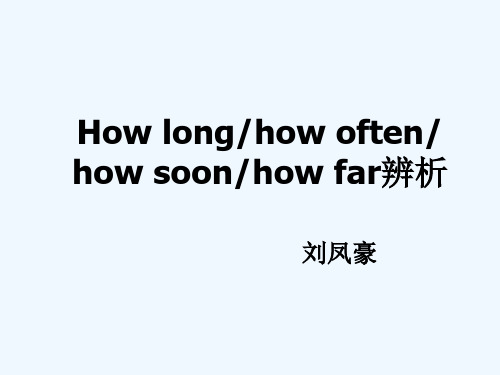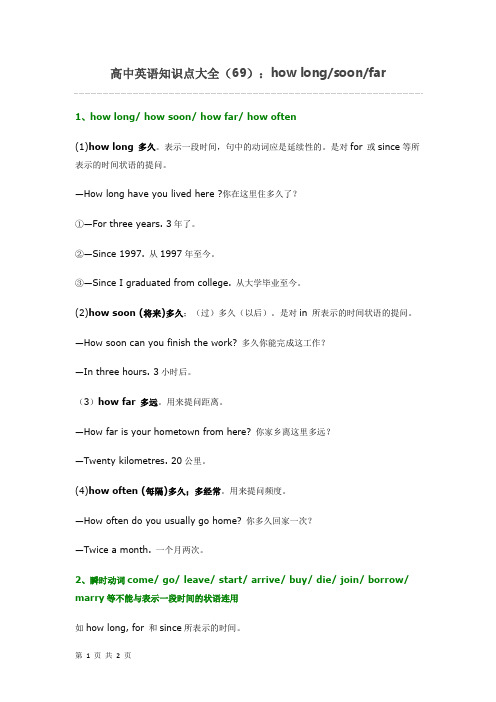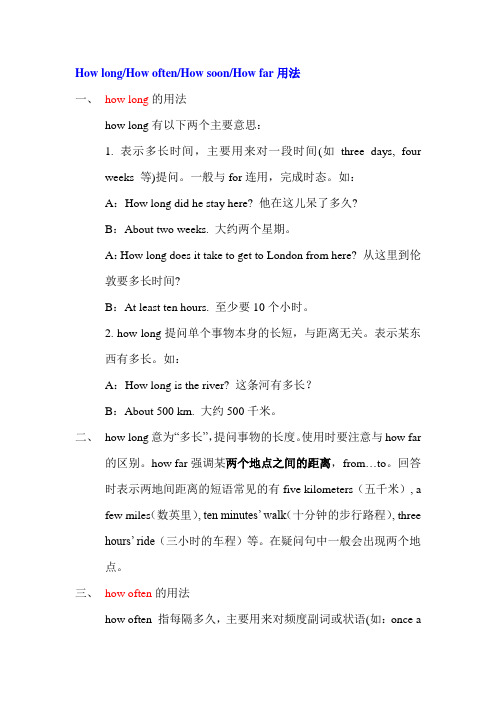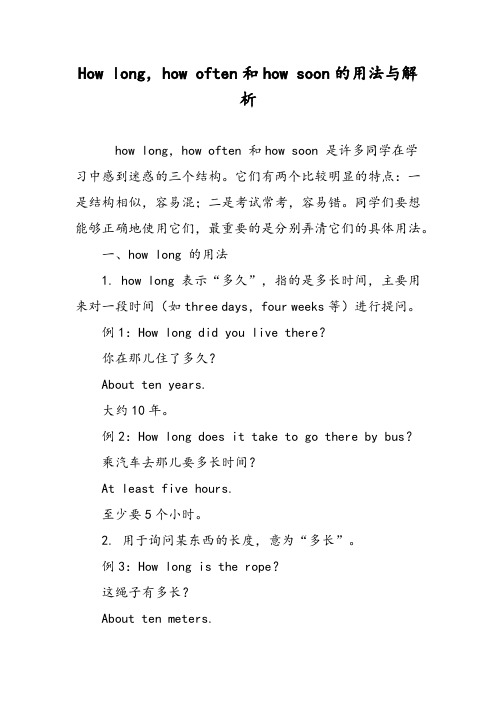How_longHow_oftenHow_soonHow_far用法(最新整理)
初中英语人教版八年级上册How soon, How ofen, How long的用

2. how often
---How often do you exercise? ---Once a week. ---How often do you do homework? ---Every day. how often“多久一次;多长时间一次”, 对表示频度的副词或短语提问。
3. how soon
how soon“还要多久;多久以后”, 常用于一般将来时态的句子中, 对问题回答通常用“in + 一段时间”。
4. how far
how far“多远”,对距离提问。
典型应用
1. —
C
are you leaving for Beijing? in + 时间段 C. How soon D. How long
How long/how often/ how soon/how far辨析
刘凤豪
本节导航
1. long
多长
2. often 多久一次 how 3. soon 4. far 多久以后 多远
知识精讲
4
1. how long
how long“多久;多长时间”, 主要用来对一段时间提问。
how long“多长”, 也可用来对物体的长短进行提问。 ─ How long is the river? 这条河有多长? ─ About 500 km. 大约500千米。
— In a couple of days. A. How far
B. How often
课堂小结
how long“多久;多长时间”,对一段时间提问。
how long“多长”,对物体的长短进行提问。
how often“多久一次;多长时间一次”, 对表示频度的副词或短语提问。
高中英语知识点大全69:how long、soon、far

高中英语知识点大全(69):how long/soon/far1、how long/ how soon/ how far/ how often(1)how long 多久。
表示一段时间,句中的动词应是延续性的。
是对for 或since等所表示的时间状语的提问。
—How long have you lived here ?你在这里住多久了?①—For three years. 3年了。
②—Since 1997. 从1997年至今。
③—Since I graduated from college. 从大学毕业至今。
(2)how soon (将来)多久;(过)多久(以后)。
是对in 所表示的时间状语的提问。
—How soon can you finish the work? 多久你能完成这工作?—In three hours. 3小时后。
(3)how far 多远。
用来提问距离。
—How far is your hometown from here? 你家乡离这里多远?—Twenty kilometres. 20公里。
(4)how often (每隔)多久;多经常。
用来提问频度。
—How often do you usually go home? 你多久回家一次?—Twice a month. 一个月两次。
2、瞬时动词come/ go/ leave/ start/ arrive/ buy/ die/ join/ borrow/ marry等不能与表示一段时间的状语连用如how long, for 和since所表示的时间。
①他去世三年了。
不能说:He has died for 3 years.而应说:He has been dead for 3 years.He died 3 years ago.It is 3 years since he died.②他参军多久了?不能说:How long has he joined the army?而应说:How long has he been in the army?How long has he been a soldier?How long is it since he joined the army?3、however adv. 然而;但是表示转折,起承上启下的作用。
英语单词辨析:如何区分How soon、How far、 How long、How often

英语单词辨析:如何区分How soon/ How far/ How long/How often
(1)How soon表示“多久之后”,主要用来对表示将来的一段时间提问。
How soon的回答一般是:“in + 时间段”,如“in two days”“in five years”。
例如:—How soon will you be ready?
—In five minutes.
(2)How far“多远”一般指的是一地到另一地的距离。
例如:—How far is it from your home to school? —Three kilometers.(3)How long表示“时间多久或物体多长”,表示时间侧重指“一段时间”。
针对“How long”的回答一般是时间段,如“for three days”,“for three years”。
例如:—How long were you away last year?
—For two weeks.
(4)How often “多长时间一次”对在某一特定的时间内进行的动作次数进行提问,其答语一般为“never,sometimes,usually”等频率副词。
例如:—How often do you exercise? —Every day.
6. Bob dislikes coffee, so he almost _________ drinks it.
A. often
B. always
C. never
D. ever。
(完整版)How_longHow_oftenHow_soonHow_far用法

How long/How often/How soon/How far用法一、how long的用法how long有以下两个主要意思:1. 表示多长时间,主要用来对一段时间(如three days, fourweeks 等)提问。
一般与for连用,完成时态。
如:A:How long did he stay here? 他在这儿呆了多久?B:About two weeks. 大约两个星期。
A:How long does it take to get to London from here? 从这里到伦敦要多长时间?B:At least ten hours. 至少要10个小时。
2. how long提问单个事物本身的长短,与距离无关。
表示某东西有多长。
如:A:How long is the river? 这条河有多长?B:About 500 km. 大约500千米。
二、how long意为“多长”,提问事物的长度。
使用时要注意与how far的区别。
how far强调某两个地点之间的距离,from…to。
回答时表示两地间距离的短语常见的有five kilometers(五千米), a few miles(数英里), ten minutes’ walk(十分钟的步行路程), three hours’ ride(三小时的车程)等。
在疑问句中一般会出现两个地点。
三、how often的用法how often 指每隔多久,主要用来对频度副词或状语(如:once aweek, three times a month 等)提问。
如:A:How often does he come here? 他(每隔)多久来一次?B:Once a month. 每月一次。
A:How often do you visit your mother? 你多长时间看你妈妈一次?B:Once a week. 一周一次。
三、how soon的用法how soon 指再过多久,主要用来对表示将来的一段时间(如:in an hour, in two weeks 等)提问。
How long,how often和how soon的用法与解析

How long,how often和how soon的用法与解析how long,how often 和how soon 是许多同学在学习中感到迷惑的三个结构。
它们有两个比较明显的特点:一是结构相似,容易混;二是考试常考,容易错。
同学们要想能够正确地使用它们,最重要的是分别弄清它们的具体用法。
一、how long 的用法1. how long 表示“多久”,指的是多长时间,主要用来对一段时间(如three days,four weeks等)进行提问。
例1:How long did you live there?你在那儿住了多久?About ten years.大约10年。
例2:How long does it take to go there by bus?乘汽车去那儿要多长时间?At least five hours.至少要5个小时。
2. 用于询问某东西的长度,意为“多长”。
例3:How long is the rope?这绳子有多长?About ten meters.大约10米。
二、how often 的用法how often 也表示“多久”,但通常指每隔多久,主要用来对频率副词或状语(如once a week, three times a month 等)进行提问。
例4:How often do the buses run?每隔多久发一次车?Every five minutes.每隔五分钟。
例5:How often do you go to the cinema?你们隔多久看一次电影?Once a week, sometimes twice and even three times aweek.一周一次,有时一周两次甚至三次。
三、 how soon的用法how soon 也表示“多久”,但它指的是再过多久,主要用来对表示将来的一段时间(如in an hour, in two weeks 等)进行提问。
完整版How longHow oftenHow soonHow far用法

How long/How often/How soon/How far用法一、how long的用法how long有以下两个主要意思:1. 表示多长时间,主要用来对一段时间(如three days, fourweeks 等)提问。
一般与for连用,完成时态。
如:A:How long did he stay here? 他在这儿呆了多久?B:About two weeks. 大约两个星期。
A:How long does it take to get to London from here? 从这里到伦敦要多长时间?B:At least ten hours. 至少要10个小时。
2. how long提问单个事物本身的长短,与距离无关。
表示某东西有多长。
如:A:How long is the river? 这条河有多长?B:About 500 km. 大约500千米。
二、how long意为“多长”,提问事物的长度。
使用时要注意与how far的区别。
how far强调某两个地点之间的距离,from…to。
回答时表示两地间距离的短语常见的有five kilometers(五千米), afew miles(数英里), ten minutes' walk(十分钟的步行路程), three hours' ride(三小时的车程)等。
在疑问句中一般会出现两个地点。
三、how often的用法once a如:(主要用来对频度副词或状语指每隔多久,how oftenweek, three times a month 等)提问。
如:A:How often does he come here? 他(每隔)多久来一次?B:Once a month. 每月一次。
A:How often do you visit your mother? 你多长时间看你妈妈一次? B:Once a week. 一周一次。
三、how soon的用法how soon 指再过多久,主要用来对表示将来的一段时间(如:in an hour, in two weeks 等)提问。
how-long--how-often--how-soon的用法总结

how long, how often, how soon的用法总结以下是为大家整理的how long, how often, how soon的用法归纳,希望能帮助大家更好掌握这个几单词,提高英语水平。
英语疑问词家族中有这样“三姊妹”:how long, how often, how soon。
她们都是用来引导特殊疑问句的。
但三个的秉性却大不相同。
让我们一起来认识她们!老大:how long的用法总结how long可用于询问某个动作或状态所持续的时间,意为“多久、多长时间”,句中的谓语动词要用延续性动词,回答时常用about two days(大约两天), five hours(5个小时)等表示一段时间的状语。
how long也可用来对物体的长短进行提问。
如:;;How long is the river? 这条河有多长?;;It’s about 5,000 kilometers long. 大约5000公里长。
;;How long did you keep the book? 这本书你借了多长时间?;;About two weeks. 大约两个星期。
老二:how soon的用法总结how soon常用来对从某个基本时间到将来某个动作结束或某个动作发生这段时间提问,表示“还要多久”,在一般将来时态的句子中,对问题回答通常用“in+一段时间”。
如:;;How soon will you come back? 你要多久才回来?;;In two hours. 两个小时后。
;;How soon can you finish your homework?还要多久你能完成作业?;;In half an hour. 半个小时后。
◆how many;how much凑热闹how many是对可数名词的数量进行提问,其后接可数名词的复数形式。
如:;;How many hours do you exercise every week?你每周锻炼多少小时?;;More than five hours. 五个多小时。
How long、how far、how often、how soon深入辨析

How long、how far、how often、how soon深入辨析
How long,how far ,how often,how soon这四个短语在对时间和距离提问时扮演着重要的角色。
具体的区别有哪些呢一起往下看看吧!
1.首先,how long根据字面翻译为“多长”,没错!但这里的多长具体指什么呢一般分为两种情况:第一种情况为对时间的提问,意为“多长时间”,一般对过去发生的时间提问,例如我们平时说的某件事花费了多长时间都可以用how long来询问。
其回答一般为时间段,如:for a day。
-How long did you stay here
你在这里待了多久。
-For two hours.
两小时。
第二种情况可以用来提问具体物体的长度。
例如:
-How long is the board
这条木板有多长
-About one meter.
大约一米。
- 1、下载文档前请自行甄别文档内容的完整性,平台不提供额外的编辑、内容补充、找答案等附加服务。
- 2、"仅部分预览"的文档,不可在线预览部分如存在完整性等问题,可反馈申请退款(可完整预览的文档不适用该条件!)。
- 3、如文档侵犯您的权益,请联系客服反馈,我们会尽快为您处理(人工客服工作时间:9:00-18:30)。
How long/How often/How soon/How far 用法
一、how long 的用法
how long 有以下两个主要意思:
1.表示多长时间,主要用来对一段时间(如three days, four
weeks 等)提问。
一般与for 连用,完成时态。
如:
A:How long did he stay here? 他在这儿呆了多久?
B:About two weeks. 大约两个星期。
A:How long does it take to get to London from here? 从这里到
伦敦要多长时间?
B:At least ten hours. 至少要10 个小时。
2.how long 提问单个事物本身的长短,与距离无关。
表示某东
西有多长。
如:
A:How long is the river? 这条河有多长?
B:About 500 km. 大约500 千米。
二、how long 意为“多长”,提问事物的长度。
使用时要注意与how
far 的区别。
how far 强调某两个地点之间的距离,from…to。
回答时表示两地间距离的短语常见的有five kilometers(五千米), a few miles(数英里), ten minutes’ walk(十分钟的步行路程), three hours’ ride(三小时的车程)等。
在疑问句中一般会出现两个地点。
三、how often 的用法
how often 指每隔多久,主要用来对频度副词或状语(如:once
a week, three times a month 等)提问。
如:
A:How often does he come here? 他(每隔)多久来一次?
B:Once a month. 每月一次。
A:How often do you visit your mother? 你多长时间看你妈妈一次?
B:Once a week. 一周一次。
三、how soon 的用法
how soon 指再过多久,主要用来对表示将来的一段时间(如:in an hour, in two weeks 等) 提问。
如:A:
How soon will he be back? 他要多久才回来? B:
In an hour. 1 小时以后。
A:How soon shall we know the results? 我们多久能知道结果? B:I don’t know. 我不知道。
How far 和How long 的区别
A:持续多长时间(多久)
how long
How long have you been here?
For five months.
长度(多长)
how long
How long is the bridge?
It’s 500 metres.
距离(多远)
how far
How far is it from here to the zoo?
It’s 6 kilometres.
四、练习题
对划线部分提问
1、It took me three hours to do my homework.
to do homework? How long did it take you/ your
2、He will come here in ten minutes.
will he ? How soon/ come here
3、Mary visits her parents once a week.
her parents? How often does Mary visit 4、It is five miles from the bookshop to the bus station.
————from bookshop to the bus station? How far is it
5、There are two apples in my bag. How many/are there your
apples in bag?
6、The line is about six meters . How long
is the line?
7、“will he leave here?”“He will leave here in a month”
A. How often
B. How long
C. How soon
D. How many times
8.“does he watch TV” “Once a week.”
A. How long
B. How soon
C. How often
D. How many
9.I don’t know he will get here.
A. how long
B. how soon
C. how often
D. how many
10.“does he take this medicine?”
“Twice a day.”
A. How soon
B. How long
C. How much
D. How often
11.“have you been at this factory?”
“I have been here since1993.”
A. When
B. How long
C. How often
D. What time a
12.“can you finish this work?”
A. How often
B. How soon
C. How long
D. How far
13.“will he stay here?”
A. How many times
B. How often
C. what time
D. How long
14.does your sister write to your parents?
A. How many
B. How often c. How long D. How far
15.does it take you to finish you homework every day?
A. How long
B. How often
C. How soon
D. How much
答案:1、How long did it take you /your 2、How soon/come here
3、How often does Mary visit
4、How far is it
5、How many /are there /your
6、How long
7、C
8、C
9、B 10、D 11、B 12、B 13、D 14、B 15、A
“”
“”
At the end, Xiao Bian gives you a passage. Minand once said, "people who learn to learn are very happy people.". In every wonderful life, learning is an eternal theme. As a professional clerical and teaching position, I understand the importance of continuous learning, "life is diligent, nothing can be gained", only continuous learning can achieve better self. Only by constantly learning and mastering the latest relevant knowledge, can employees from all walks of life keep up with the pace of enterprise development and innovate to meet the needs of the market. This document is also edited by my studio professionals, there may be errors in the document, if there are errors, please correct, thank you!。
